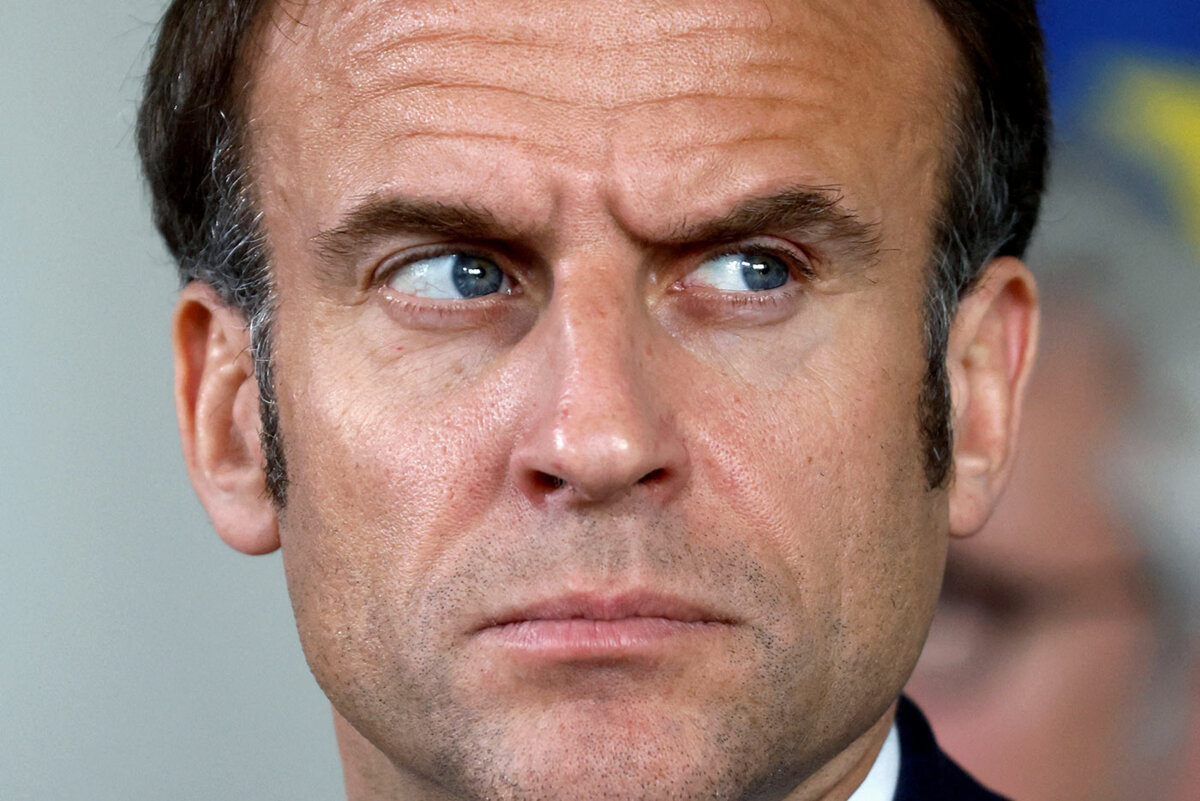In the end you have to face facts. The recent retirement age reforms in France was not just about pensions. Instead, a broader political project was at play. The aim was much more about imposing one man's power on an entire society. By imposing his reform, the president of the Republic disregarded political opposition in the National Assembly, unprecedented social protests and the plan's general unpopularity.
As a result Emmanuel Macron has proven that the current regime in France is no longer subject to any real counterbalances and that it is now possible to rule France based on his wishes alone. He does not even need a majority in Parliament.
This demonstration serves two purposes. First of all, it discourages any future resistance to his power as he has now won the “mother of all battles”. Secondly, it enables a process in which power is 'bolted down' as the government confronts those who still resist.
It is in this light that we should examines the actions of the government and its supporters over the last month. On the one hand, and for the edification of the masses, there has been the stage-managed image of a president who is both everywhere and all-powerful, solving all the problems that are still affecting the country, one by one. One day Emmanuel Macron is re-industrialising the country; the next he is fixing the problem of prescription drug shortages; and on another day he is saving the planet with a dose of “green growth”. The message is clear: the president is able to do what he wants, and it is thus pointless and indeed harmful to try to stop him.

Enlargement : Illustration 1

On the other hand, the executive's authoritarian grip on the country grows stronger by the day. The violent repression of the protests against the pension reform was followed by the repression of environmental protests and movements, the culmination of which came on Wednesday with the announcement that the environmental group Les Soulèvements de la Terre has been shut down. This has all been stage-managed in a way designed to justify repression, as seen with the searches and arrests of activists on June 20th and similar actions which occurred on June 5th. There has also been pressure put on the human rights organisation the Ligue des Droits de l’homme (LDH) and other groups. It has reached a point where the United Nations recently expressed concern over the state of the “right to peaceful assembly” in France.
Meanwhile at the European Council – which is part of the European Union's executive arm - France has sought to limit the protection afforded to journalists where there are “threats to national security” (read the investigation on this by Investigate Europe). And the French Senate has backed the use of measures in certain investigations that would allow smartphone cameras and microphones to be activated remotely.
The cherry on the cake came last Monday when veteran Macron loyalist Richard Ferrand, the former president of the National Assembly, gave an interview to Le Figaro newspaper. At one point the former MP raised the idea of changing France's Constitution to remove the current restriction on anyone serving more than two successive terms as president. The justification for this change was astonishing. “All of this puts a straitjacket on our public life with rules that limit the free choice of citizens,” he declared.
An extremist approach
Fortunately we are a long way away from seeing Richard Ferrand's dream realised. Such a reform seems unlikely to attract a majority either in a joint congress of the two chambers of the French Parliament - needed to approve changes in the Constitution – or among the public. But this potential option, formulated for the first time in such a clear way, is certainly a sign of the political vision that dominates at the Élysée. The president can now impose his views on society which, willingly or otherwise, will have to acknowledge his superiority, something he keeps on highlighting.
In Marcel Carné's film 'Les Enfants du Paradis', the famed actor Frédérick Lemaître agrees to perform in a play “provided that it plays along with me". That is how Emmanuel Macron accepts democracy: provided that it is on his terms.
Talk of a third term now clearly places Macronism in the camp of those personal regimes that are ready to tinker with electoral laws and constitutions in order to cling onto power. Recep Tayyip Erdoğan changed the Turkish Constitution to install a presidential regime of which he, naturally enough, was the beneficiary. Viktor Orbán changed the electoral law in Hungary to ensure he had huge majorities that would allow him to change the constitution. Then of course there is Vladimir Putin, who having first worked around the Russian Constitution, ended up changing it so he could stay president.
We can clearly see here a step change in Macronism's authoritarian approach, an approach which has indeed been a dominant characteristic of this political movement since the repression of the 'yellow vest' protest movement that began in 2018. It is also in this context that one has to understand the calls for “national unity” that are coming from people around the president. Such words have been heard a great deal among the ruling majority for several weeks now, and this was the central theme of Richard Ferrand's interview with Le Figaro.
The reasoning appears to be along the following lines: as nothing can resist the president, as it has been proven that it is pointless to try to oppose his wishes and that, in the end, evidence points to the fact that the head of state is able to resolve all problems, the only rational option is to submit. Richard Ferrand is effectively saying this when he states: “It's this strategic decision [editor's note, an alliance with the president's party] or democratic suicide.” And he adds: “You can't always stop collective madness stemming from a loss of common sense, but this would then be deployed to the detriment of fundamental values.”

Enlargement : Illustration 2

This last sentence is quite remarkable in the light of what has just been discussed. The president, who holds this country ever more tightly in his grip as if it were his prey, who refuses to listen to the people, and who bans environmental movements, is supposedly a bastion against a “collective madness” that threatens “fundamental values”?
Such comments only have one purpose: to make it clear that the president has no democratic opposition. The president thus comes to represent democracy himself. It is evidently a familiar stance for those with an authoritarian approach in France. Every repressive regime in the 19th century was built around an identification between 'values' and one man.
In 1804 a Senate decree established the new Empire in this way: “The government of the Republic is conferred on an hereditary emperor.” At the time it all seemed very natural: faced with opposition from Left and Right, Napoleon Bonaparte was identified with the Republic of “common sense”. And the farcical imperial proclamation was simply the logical conclusion from such identification. This was just like Richard Ferrand's thinking, according to which you have remove the restriction on more than two successive presidential terms in order to have real democracy.
One sees the same logic occurring at other key moments in French history. In 1830 one was led to believe that Louis-Philippe represented freedom against bloodthirsty republicans and reactionary monarchists. In 1851 Louis-Napoleon Bonaparte followed the same script: he represented democracy against an Assembly that had limited the right to vote and repressed workers. He then established universal male suffrage (under the supervision of local prefects). Finally, from 1871 to 1873, it was the same ruse that allowed Adolpe Thiers to establish his government.

Enlargement : Illustration 3

Creating a model populace
Emmanuel Macron is in that same tradition. It is important to note at this point that these regimes were not imposed solely because of the “madness” or “thirst for power” of their leading figure. In each case it was less about imposing the desires of one man than the wishes of a class, the owners and managers of capital. It is no different in today's France. That was exactly why the pension reform, which was first and foremost an attack on the world of work and social protection in order to fund tax cuts on businesses and capital, was the “mother of all battles”.
Obviously this type of regime uses every method to hide its class-based nature, and what better way than creating the idea of the “good people”. These “good people” are reasonable and do not like “extremes”, they accept the dominant economic consensus and, in short, they back the president. These people are set against the “mob” and victims of “collective madness” who are helpfully excluded from the “national union” that the head of state supposedly represents.
It is a classic scenario. Following the coup d'état of December 2nd 1851, the future Napoleon III used a phrase that sums up the entire policy of the current government of the French Republic: “It's time for the good to feel reassured and for the wicked to tremble.”
These exercises in dissimulation can also make use of figures from the workers' movement, such as Missak Manouchian, the French-Armenian poet whom Emmanuel Macron announced last Sunday will enter France’s Panthéon mausoleum of historical figures. A real worker, a communist, an internationalist, an immigrant and a Resistance hero: surely this is proof that the president is not sectarian!
Except that one cannot help wondering what the current regime would do today with someone such as Manouchian. Would he be considered a victim of the “collective madness” that would lead him to defend a pension system that his sacrifice helped put in place after the Liberation of France? Would he be locked up in an administrative detention centre? Taken back to the border? Or tolerated, as long as he met the needs of the market economy, something that would put him at odds with his lifelong struggle? For this government, a good revolutionary is above all a dead revolutionary, who can then be celebrated.
This regime's authoritarian slide is nothing new. From the repression of the 'yellow vests' to the handling of the Covid health crisis, and including the first use of constitutional shortcuts to circumvent Parliament over pension reforms back in 2020, the Macronist movement has tightened its grip on the country at regular intervals. But the latest developments are yet more worrying, as several lines appear to have been crossed. “When you have conquered over pensions, you can withstand anything,” prime minister Élisabeth Borne declared on Tuesday.
This breezy confidence hides a rather less cheery reality. For this policy in favour of capital, which is the basis of this authoritarianism, has in reality suffered failure after failure as part of a capitalism that is increasingly struggling and destructive, and which is confronted by a French people who, despite everything, now reject it more than ever.
Consequently, the only solution left is indeed an authoritarian dash to 'force' reality to yield to presidential myths. And too bad if the country simply has to suffer yet more of such madness.
------------------------------------------------------------------------
- The original French version of this op-ed can be found here.
English version by Michael Streeter


